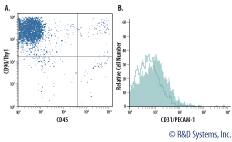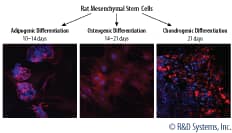Rat Mesenchymal Stem Cells (1 x 10e6 cells/vial)
Rat Mesenchymal Stem Cells (1 x 10e6 cells/vial) Summary
Kit Summary
For the study of rat mesenchymal stem/stromal cells and/or reliable differentiation to adipocytes, chondrocytes, and osteocytes.
Key Benefits
- Ready to use
- High purity reduces experimental variation
- Confirmed phenotype of CD90+, CD45-, CD31-
- Confirmed multipotency
Why use Pre-Isolated Fully Characterized Rat Mesenchymal Stem Cells?
Although there are a number of protocols available to isolate rat mesenchymal stem cells, each isolation can vary in the yield, purity, quality, and the ability of the cells to proliferate.
R&D Systems offers Rat Mesenchymal Stem Cells that are of high purity, isolated at a low passage number, and are free of mycoplasma and microbial contamination.
R&D Systems Rat Mesenchymal Stem Cells:
- Are of high purity.
- Are positive for CD90 expression; negative for CD45 and CD31 expression.
- Have been shown to differentiate into adipocyte, chondrocytes, and osteocytes.
- Are fully characterized to reduce experimental variation.
- Are free of mycoplasma and microbial contamination.
- Were isolated at passage 2.
Mesenchymal Stromal Cells or Mesenchymal Stem Cells?
The term ‘mesenchymal stromal cells’ is commonly used to describe a heterogeneous population of cultured cells that are adherent to plastic, have a distinct morphology, and express a specific set of marker proteins. Within this heterogeneous population are cells referred to as ‘mesenchymal stem cells.
Mesenchymal stem cells are multipotent, self-renewing cells that have the ability to differentiate into adipocytes, chondrocytes, and osteoblasts when cultured in vitro.
2006 Proposed Change to MSC Nomenclature
Although mesenchymal stromal cells were once referred to as ‘mesenchymal stem cells,’ a change to ‘mesenchymal stromal cells’ was proposed by the International Society for Cellular Therapy in 2006.1
The change in nomenclature originates from two important factors:
- Methods used to isolate mesenchymal stem cells yield a heterogeneous population of cells with only a fraction of these cells demonstrating multipotency.
- The absence of direct evidence that mesenchymal stem cells can self-renew and differentiate in vivo.
Use of Mesenchymal Stem and Stromal Cell Terminology
Data supporting MSC self-renewal and multipotency have been obtained using in vitro conditions, which does not adequately reflect the in vivo environment. The lack of in vivo data has led some researchers to question the validity of the term ‘mesenchymal stem cell’ providing further support for the use of ‘mesenchymal stromal cells’ to describe MSCs.2 While ‘mesenchymal stromal cells’ may be the more scientifically accurate term for MSCs, the two terms are often used interchangeably in the literature. R&D Systems recognizes the use of both mesenchymal stem cells and mesenchymal stromal cells and uses ‘MSC’ to indicate mesenchymal stem/stromal cells to account for both designations.
- Mesenchymal Stromal Cells – A heterogeneous population of cultured cells with similar characteristics such as the ability to adhere to plastic and the expression of specific marker proteins.
- Mesenchymal Stem Cells – A subpopulation of mesenchymal stromal cells that have the capacity to self-renew and differentiate into mesodermal lineages when cultured in vitro. The capacity to self-renew and differentiate in vivo has yet to be clearly demonstrated for mesenchymal stem cells.
References
- Dominici, M. et al. (2006) Cytotherapy 8:315.
- Keating, A. (2012) Cell Stem Cell 10:709.
Contents
1 vial of Rat Mesenchymal Stem Cells containing 1 x 106 cells.
Stability and Storage
Store in liquid nitrogen for up to 1 year.
Precautions
This product contains trace amounts of DMSO.
Quality Control
Rat Mesenchymal Stem Cells from this lot have been thawed and tested for their ability to proliferate for up to 5 passages. Stem and progenitor cells (CD90+ CD45- CD31-) expanded from the end of passage 5 have been examined for CD90, CD45, and CD31 expression (see below). They were also tested for their ability to differentiate into adipocytes, chondrocytes, and osteocytes using the Rat Mesenchymal Stem Cell Functional Identification Kit (Catalog ;# SC020).
The cells tested negative for mycoplasma using the MycoProbe™ Mycoplasma Detection Kit (Catalog # CUL001B). The cells also tested negative for microbial contamination.
 View Larger Image |
Rat Mesenchymal Stem Cells Show Positive Expression of CD90/Thy1 and Negative Expression of CD45 and CD31. A. Rat mesenchymal stem cells (Catalog # PSC003) were stained for the indicated markers after passage 5. CD90/Thy1 was detected using an Anti-Rat CD90/Thy1-RPE Antibody, CD45 was detected using an Alexa 687-conjugated Anti-Rat CD45 Antibody. B. CD31 was detected using a Goat Anti-Mouse CD31/PECAM-1 Affinity Purified Polyclonal Antibody (Catalog # AF3628) (filled histogram) or a Normal Goat IgG isotype control (Catalog # AB-108-C, empty histogram) followed by a PE-conjugated Donkey Anti-Goat Secondary Antibody (Catalog # F0107). |
 View Larger Image |
Verification of Rat Mesenchymal Stem Cell Multipotency. Rat Mesenchymal Stem Cells (Catalog # PSC003) were cultured in StemXVivo™ Mesenchymal Stem Cell Expansion Media (Catalog # CCM004) and differentiation was induced as indicated using the media supplements included in the Rat Mesenchymal Stem Cell Functional Identification Kit (Catalog # SC020). The kit also contains a Goat Anti-Mouse FABP4 Antigen Affinity-purified Polyclonal Antibody (adipocytes), a Mouse Anti-Human Osteocalcin Monoclonal Antibody (osteocytes), and a Goat Anti-Human Aggrecan Antigen Affinity-purified Polyclonal Antibody (chondrocytes) for the confirmation of differentiation status. The cells were stained using the NorthernLights 557-conjugated Donkey Anti-Goat (Catalog # NL001; red) or Anti-Mouse (Catalog # NL007; red) Secondary Antibody, and the nuclei were counterstained with DAPI (blue). |
BG01V human embryonic stem cells are licensed from ViaCyte, Inc.
Specifications
Product Datasheets
Assay Procedure
Refer to the product datasheet for complete product details.
Briefly, Rat Mesenchymal Stem Cells can be cultured using the following procedure:
- Thaw rat MSCs
- Plate rat MSCs at 5 x 105 cells per T75 flask
- Passage when cells are 80% confluent
Reagents Supplied with Rat Mesenchymal Stem Cells (Catalog # PSC003)
- 1 vial of Rat Mesenchymal Stem Cells containing 1 x 106 cells
Reagents
- StemXVivo™ Mesenchymal Stem Cell Expansion Media (Catalog # CCM004)
- 2 mL pipette
- 15 mL tube
Materials
- T75 flasks
- 15 mL tube
- 50 mL tube
- Hemocytometer
Equipment
- Centrifuge
- 37 °C water bath
Rat Mesenchymal Stem Cells from this lot have been thawed and tested for their ability to proliferate for up to 5 passages. Stem and progenitor cells (CD90+ CD45- CD31-) expanded from the end of passage 5 have been examined for CD90, CD45, and CD31 expression (see below). They were also tested for their ability to differentiate into adipocytes, chondrocytes, and osteocytes using the Rat Mesenchymal Stem Cell Functional Identification Kit (Catalog # SC020).
The cells tested negative for mycoplasma using the MycoProbe™ Mycoplasma Detection Kit (Catalog # CUL001B). The cells also tested negative for microbial contamination.
I. Thawing of Cryopreserved Rat Mesenchymal Stem Cells
Thaw a vial of 1 x 106 Rat Mesenchymal Stem Cells.

Transfer the cells into a 15 mL centrifuge tube containing pre-warmed StemXVivo™ Mesenchymal Stem Cell Expansion Media (Catalog # CCM004).
Centrifuge the tube at 200 x g for 5 minutes.

Remove the supernatant.
Resuspend the cells in 10 mL of pre-warmed StemXVivo Mesenchymal Stem Cell Expansion Media.

Perform a cell count.

Plate the cells into two flasks at approximately 5 x 105 cells per T75 flask.

II. Subculture of Mesenchymal Stem Cells
Remove and discard the media from the T75 tissue culture flask(s) containing the rat MSCs and wash the cells twice with 10 mL of PBS.

Add 1-2 mL of pre-warmed Trypsin to the cells and incubate the flask at 37 °C.

After the cells have detached, add 5 mL of pre-warmed StemXVivo Mesenchymal Stem Cell Expansion Media to the flask.

Transfer the disassociated cells to a 15 mL conical tube.
Centrifuge at 200 x g for 5 minutes. Discard the supernatant.

Resuspend the cell pellet in 5 mL of StemXVivo Mesenchymal Stem Cell Expansion Media.
Perform a cell count.

- Add 2.0 x 105 cells resuspended in 20 mL of pre-warmed Completed StemXVivo MSC Expansion Media into each T75 flask.

Related Products
FAQs
No product specific FAQs exist for this product, however you may
View all Stem Cell Product FAQsReviews for Rat Mesenchymal Stem Cells (1 x 10e6 cells/vial)
There are currently no reviews for this product. Be the first to review Rat Mesenchymal Stem Cells (1 x 10e6 cells/vial) and earn rewards!
Have you used Rat Mesenchymal Stem Cells (1 x 10e6 cells/vial)?
Submit a review and receive an Amazon gift card.
$25/€18/£15/$25CAN/¥75 Yuan/¥2500 Yen for a review with an image
$10/€7/£6/$10 CAD/¥70 Yuan/¥1110 Yen for a review without an image


